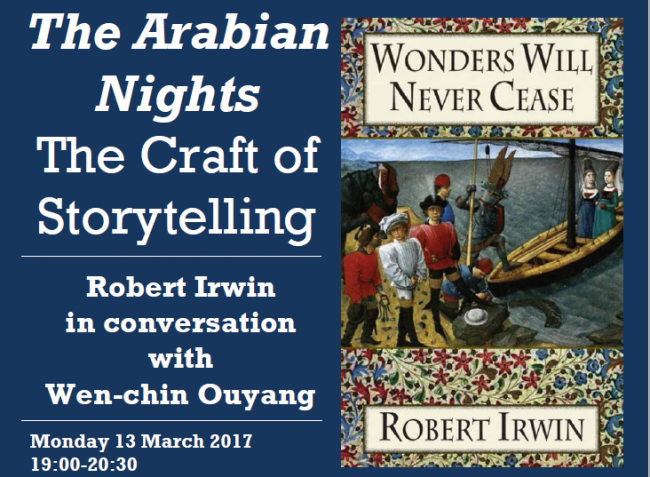The Arabian Nights and the Craft of Storytelling

World literatures today are visibly marked by multilingualism and multiculturalism. It is even possible to argue that these provide creative energy for all kinds of writing. At the end of a full day workshop on the relationship between multilingualism and creativity in world literatures last month at SOAS, Robert Irwin brought his novels to our project on Creative Multilingualism in a public event that both confirmed and challenged how we had been thinking about multilingualism and multiculturalism.
A prolific writer of scholarly works on the history of the Middle East and on Arabic literature from 13th to 16th centuries, and of fiction, with seven novels under his belt, and proficient in reading two ‘foreign’ languages, Arabic and French, Irwin had much to say about how his experiences in the Middle East and how readings in Arabic literature inspired his storytelling.
He had not yet read The Arabian Nights when he wrote his popular first novel, The Arabian Nightmare (1983), Irwin asserted; rather, he read about the frame-within-frame narrative in Mia Gerhardt’s 1963 study of the book, The Art of Storytelling: a literary study of the Thousand and one nights, and Mia Gerhardt, he quickly asserted, was not an Arabist. Irwin’s latest novel, Wonders will Never Cease (2016), which is decidedly English in its theme and language, came after his years of work on The Arabian Nights. There is little trace of Arabic, or indeed French, in the fabric of Irwin’s language, even though the outrageous fantastic in his narrative has unmistakable kinship with The Arabian Nights.
Multiculturalism is not necessarily coeval with multilingualism, Irwin reminded us, and more importantly, he brought us back to one of the key questions which had preoccupied us the entire day: where do we situate multilingualism, in the context, text or subject? These are just some of the questions our Project will seek to answer.
Wen-chin Ouyang is Professor of Arabic and Comparative Literature at SOAS, University of London. She is Strand Lead on our 5th strand: World Literatures.
Find out more about the Languages in Dialogue Workshop
Read the titles and abstracts for the Languages in Dialogue Workshop
Where next?
How Harry Potter helped to highlight Oxford's linguistic diversity
Raw and impassioned: writing multilingual poetry in an Oxford school